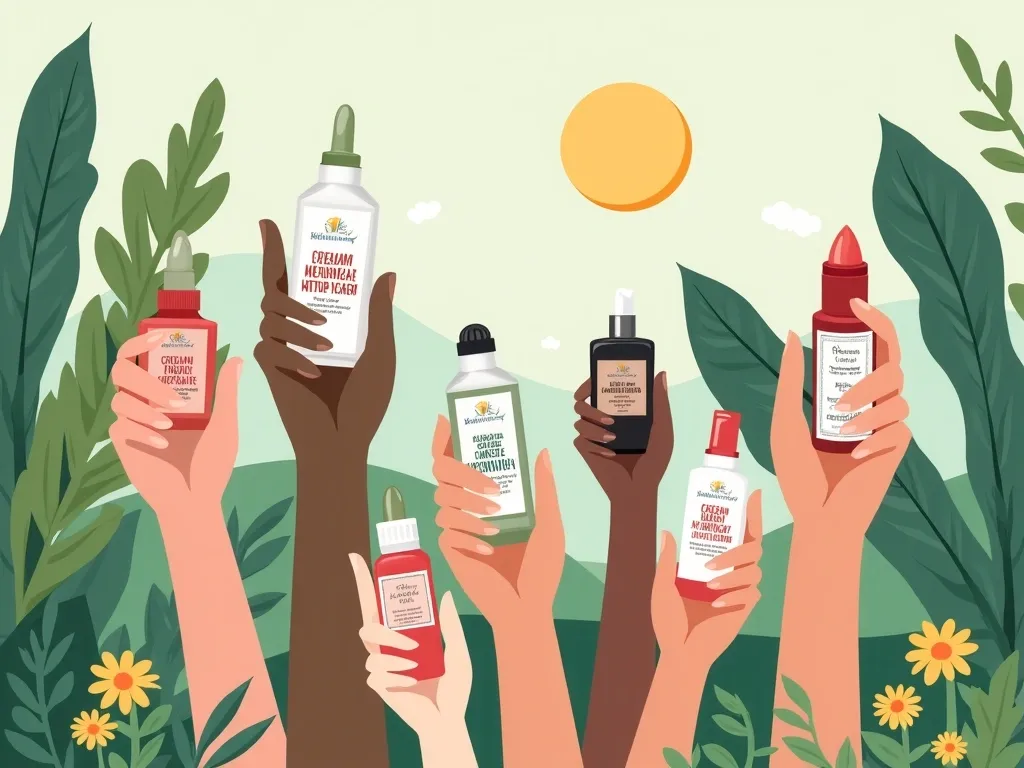In today's world, where consumer awareness is constantly growing, purchasing decisions regarding skincare products are becoming an expression not only of concern for one's own beauty, but also a manifestation of ethical values. Choosing cosmetics that have not been tested on our smaller brothers is not an impossible task. In this article, you will discover five convincing arguments that will make reaching for animal-friendly products your natural reflex during your next purchases. Learn the reasons why cruelty-free cosmetics deserve a place in your cosmetic bag and why this small gesture can contribute to a global change for the better.
What are cruelty-free cosmetics?
Cruelty-free cosmetics are products that have not been tested on animals at any stage of production. Unlike traditional cosmetics, companies creating cruelty-free products rely on alternative testing methods, such as cell culture research, tissue models or advanced computer simulations. This is a response to the growing awareness of consumers who increasingly ask: “Does beauty have to involve suffering?”
Ethics in a bottle – take care of your beauty without harming anyone
By choosing cruelty-free cosmetics, we are actively participating in the process of changing the standards of the cosmetics industry. "Each of us has a real impact on what the cosmetics market looks like," says Anna Kowalska, an animal rights activist. "Every time I reach for a product marked with a rabbit symbol, I feel like my voice counts. It's not difficult, it's just human, you know?"
It is worth emphasizing that the term "cruelty-free" refers only to animal testing, not to the composition of the products. That is why many people look for cosmetics that are both cruelty-free and vegan (containing no animal-derived ingredients such as honey, beeswax or lanolin).
Cruelty-free skincare isn’t just a trend – it’s a new standard of ethics in the beauty industry. Knowing that our beauty isn’t paid for by the suffering of innocent beings gives cosmetics their true shine.
Recognizing cruelty-free cosmetics has become easier thanks to special certificates such as Leaping Bunny, PETA's Beauty Without Bunnies or Vegan Society. These symbols guarantee that the company has undergone a rigorous process of verifying its production practices and is committed to not testing on animals.
Ethical aspects of animal testing
In today's world we face difficult moral choices, and one of them is the issue of testing cosmetics on animals. Is our beauty worth the suffering of innocent beings? This question should accompany each of us when shopping for cosmetics.
Changing our daily consumer choices is of great importance. When we reach for a product labeled “cruelty-free,” we vote not only with our wallets, but also with our hearts. Our decisions shape the market and influence the practices of cosmetic companies. We can be a catalyst for change if we want to…
It is worth noting that technological progress gives us alternatives. Cell cultures, computer models and advanced simulations allow us to test the safety of cosmetics without harming animals. We no longer have to choose between ethics and safety – we can have both.
Yet many companies still conduct painful tests, injecting substances into the eyes of rabbits or forcing rats to swallow potentially toxic compounds. These are practices that are a thing of the past, and we have the power to leave them there.
The European Union banned animal testing of cosmetics and the sale of products tested in this way in 2013. However, in many parts of the world, including China, such tests are still required by law for imported cosmetics. Our awareness and consumer choices therefore have a global dimension.
By choosing cruelty-free cosmetics, we say: "Yes, we care about our beauty, but not at the expense of the suffering of other beings." It is a declaration of compassion and responsibility that goes far beyond the drugstore shelves. It is a step towards a world where ethics and aesthetics go hand in hand...
How to recognize cruelty-free cosmetics?
Identifying cosmetics that are not tested on animals requires a conscious approach to shopping. Manufacturers use various symbols to help consumers make ethical choices: the Leaping Bunny symbol, the PETA Cruelty-Free logo, and the Vegan Society certificate are the most popular ones. Remember that your everyday shopping decisions have a real impact on animal suffering. – by choosing consciously, you vote against cruelty with your wallet.
It is also worth paying attention to the brand lists published by animal rights organizations. They are regularly updated and contain information about companies that: do not test on animals, are in the process of changing their policy or still use such practices. Checking these lists before shopping can significantly facilitate the process of choosing the right cosmetics that are in line with our values.
Reading the ingredients is another important part of recognizing cruelty-free cosmetics. Some ingredients, like carmine or lanolin, come directly from animals, which excludes them from the category of animal-friendly products. Conscious shopping is not only about caring for your own health, but also about showing respect for all living creatures. – each of us has the power to make positive changes through our everyday consumer choices. Let’s remember that ethical consumerism is not a passing fad, but a step towards a more humane world.
Popular brands offering cosmetics not tested on animals
The brand stands out in the natural cosmetics market The Body Shop, which has been fighting to ban animal testing for over 40 years. In 1989, it was the first international cosmetics company to openly oppose animal testing by launching the “Against Animal Testing” campaign. Their cruelty-free claim is not just a marketing slogan – the company has passed the rigorous Leaping Bunny certification and actively works with animal welfare organizations.
Poland's pride in the world of untested cosmetics is Receipt, whose formulas are based solely on plant-based ingredients. The brand not only avoids animal testing, but also thoroughly vets its suppliers for ethical practices. Their bestseller – the Niacinamide Face Serum – has 99.5% natural ingredients and is produced in a solar-powered factory, showing that ethics towards animals go hand in hand with concern for the environment.
“We cannot call ourselves a luxury brand if our definition of luxury includes the suffering of other beings” – this is the company’s motto Charlotte Tilbury, whose products have gained recognition among both professional make-up artists and conscious consumers.
Cruelty-free luxury is championed by Charlotte Tilbury, while cruelty-free luxury is rejected by New Zealand brand Antipodes. The latter has gained recognition for its approach to certified organic ingredients, the efficacy of which is confirmed by independent clinical studies (without animals). Their cult product, Kiwi Seed Oil Eye Cream, contains vitamin C-rich kiwi seed oil and is packaged in recyclable glass.
German company Lavera since 1987, it has been creating cosmetics in accordance with the cruelty-free philosophy. In its laboratory in Hanover, it has developed over 300 plant-based alternatives to animal ingredients. It is worth emphasizing that Lavera was one of the first mainstream brands to introduce full transparency of the composition, placing on the packaging not only INCI, but also the percentage of natural and organic ingredients certified by EcoCert.
Ethical choices are supported by manufacturers, and manufacturers support ethical consumers. Tarte Cosmetics, known for its vegan makeup brushes made from synthetic bristles, donates a portion of its profits to protect rainforests, home to endangered species. Their Shape Tape concealer line, manufactured without parabens and phthalates, contributes to the protection of biodiversity every time it lands in a conscious customer's basket, showing how everyday shopping choices can have a global impact.
Benefits for the environment and consumers
Choosing cruelty-free cosmetics brings numerous benefits to both the environment and the consumers themselves. Resignation from animal testing helps reduce the suffering of thousands of creatures every year, while promoting a more ethical and humane approach to cosmetic testing. It’s not just animals who benefit from this change – we, as consumers, also receive products that have undergone modern, often more precise testing methods.
In the interests of the planet, innovative research solutions are emerging. Alternative testing methods, such as cell cultures or tissue models, are not only more humane, but often provide more accurate results regarding human skin response. This is especially important in the case of allergies and irritations., the mechanisms of which may differ significantly in animals and humans.
We rarely talk about it, but companies that produce cruelty-free cosmetics often pay more attention to the ingredients in their products. With the environment in mind, they choose raw materials from sustainable sources, avoid problematic ingredients, and introduce biodegradable or recyclable packaging. Such a comprehensive, ethical business model benefits the entire ecosystem – from tiny organisms to ourselves.
Ethical revolution in your cosmetic bag – time for conscious choices
Cruelty-free cosmetics are not only a trend, but above all an ethical choice that brings benefits on many levels. As we presented in the article:
- Giving up animal testing is a step towards a more humane world
- Cruelty-free brands often use more innovative and safer testing methods
- By choosing cosmetics that are not tested on animals, we support companies guided by ethical values.
- Certificates as MAP Does Leaping Bunny help identify authentic cruelty-free products?
“But are these cosmetics just as effective?” a skeptic might ask. The answer is clear: yes! Modern methods of testing without animals provide equally reliable results, and cruelty-free companies create products of the highest quality.
Take the first step today – review your cosmetics bag and consciously choose products marked with the rabbit symbol when you next shop. Join the growing community of consumers who are changing the face of the cosmetics industry to a more ethical one with their choices. Your decision matters!
Check out our guide to the best cruelty-free brands and start your adventure with cosmetics that are good not only for you, but also for the entire planet!
Guide Written by Pretty Woman new Market
Frequently asked questions
How to recognize if a cosmetic is truly cruelty-free?
True cruelty-free cosmetics are certified by organizations such as Leaping Bunny, PETA, or the Vegan Society. Look for their logos on product packaging. It is also worth checking the lists of cruelty-free brands available on these organizations' websites. Some companies can use misleading terms, so certificates are the most reliable confirmation.
Are cruelty-free cosmetics more expensive than traditional ones?
Not necessarily. Prices for cruelty-free cosmetics vary greatly and depend mainly on the brand, quality of ingredients, and positioning of the product on the market. Currently, there are both budget and luxury brands on the market that do not test on animals. Over time, as the production of ethical cosmetics becomes more common, their prices become more competitive.
Are cruelty-free cosmetics as effective as traditional ones?
Yes! The effectiveness of a cosmetic does not depend on whether it was tested on animals. Modern testing methods, such as computer modeling, cell cultures or artificial skin models, provide equally reliable results. Cruelty-free companies often focus on high-quality ingredients and innovative formulas. Many cruelty-free brands regularly win industry awards for the effectiveness of their products.
Is a cruelty-free cosmetic automatically vegan?
Not always. Cruelty-free cosmetics only mean that they have not been tested on animals, but they may contain ingredients of animal origin. Examples of such ingredients include honey, beeswax, lanolin, and carmine. If you want completely vegan cosmetics, look for products that are labeled "vegan" or "vegan-friendly." Be sure to read the ingredients if you want to avoid specific ingredients.
Does the switch to cruelty-free cosmetics actually impact animal welfare?
Absolutely. Every consumer choice of cruelty-free products sends a clear signal to the cosmetics industry. In recent years, we have seen more and more companies changing their policies, abandoning animal testing in response to the growing demand for ethical cosmetics. It is estimated that millions of animals suffer in cosmetic tests worldwide every year. By choosing cruelty-free cosmetics, you contribute to reducing this number and support a humane approach to cosmetic production.







